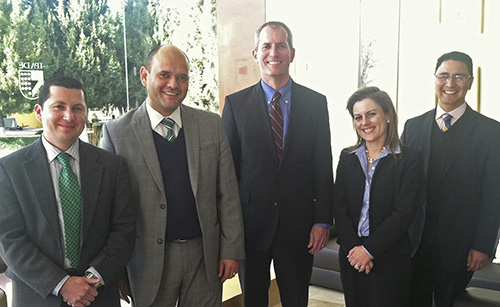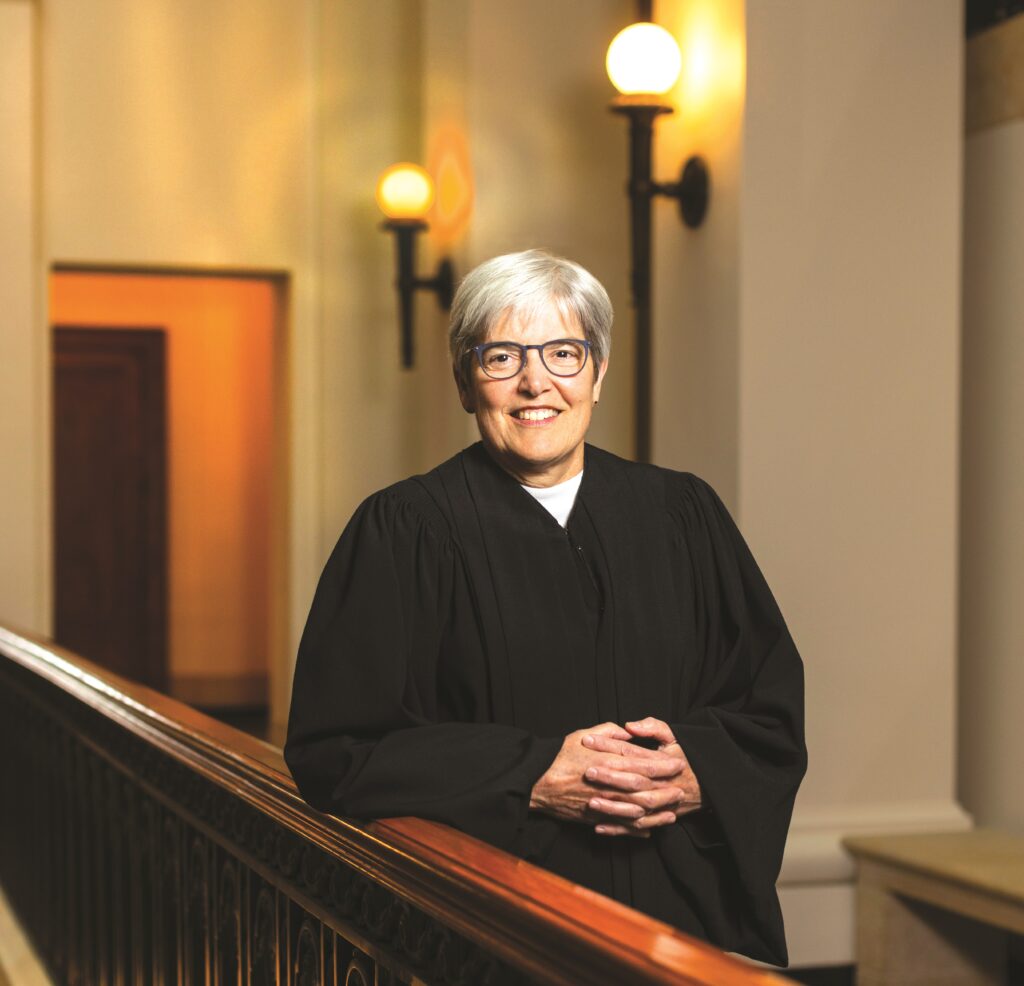Mariana Hernandez Crespo, an associate professor at the University of St. Thomas School of Law and executive director of the UST ADR Research Network, is part of a prominent group of global experts who are wrestling with the issue of investor-state dispute settlements.
“My scholarship focuses on opportunities for enhancing investor-state relationships through dispute resolution systems at the local, national and international levels. This is especially relevant given the global expansion of markets and the impact that a robust system of conflict resolution can have on promoting foreign direct investment,” she said.
One of the side effects of living in a world that appears to be getting smaller day by day is that it also happens to be getting bigger. The virtual highways that now crisscross the international landscape allow for communications and information to travel all but instantaneously from one hemisphere to the other. This brings people together who before would have been separated by thousands of miles.
As a matter of course, the worlds of business, commerce and politics have been altered accordingly. Would-be colleagues, trading partners and political affiliates are able to interact with each other more efficiently and on a more direct level than ever before. This situation has allowed for once-distant associates to become neighbors and for long-distance liabilities to become opportunities.
However, the bigger the field becomes, the more varied the actors who play in it and their perspectives, positions, interests and values. While it is highly beneficial to throw wide the doors of the global forum and international marketplace, it can be quite another matter to try to resolve the disputes. The new array of diverse actors increases the levels of complexity in attempting settlements that satisfy local, national and international interests and at the same time reduce the risk associated with cross-border transactions.
Strengthening Investor-State Relationships by Transforming Challenges Into Opportunities
Professor Mariana Hernandez Crespo’s scholarship searches for alternatives to capitalize on some of the challenges that this new global reality poses to the realm of direct foreign investment. Her scholarship focuses on ways to enable collective innovation through the promotion of participatory decision-making processes that include all of the potentially affected stakeholders. She suggests that in order to make the implementation of International Investment Treaties more sustainable, it is necessary to strengthen the business relationships between foreign investors and their respective host countries by managing conflict effectively through local, national and international conflict management and dispute systems design (DSD).
The Evolution of International Settlements in Investor-State Disputes

Dean Robert Vischer and Associate Professor Mariana Hernandez Crespo meet with law faculty and university leaders at Universidad Panamericana in Aguascalientes, Mexico.
Over the last decades, the area of investor-state disputes has evolved from a system where disputes were resolved by methods such as “gunboat diplomacy” or diplomatic espousal to Bilateral Investment Treaties (BITs) and the investment chapters within the Free Trade Agreements (FTAs). These treaties, which have now become the norm, stipulate arbitration as the mechanism for dispute resolution between host countries and foreign investors. While this move from mainly power- and political-based systems to a system that provides a rights-based alternative can be considered a step forward, there are still significant levels of dis- satisfaction with the current regime that cannot be ignored.
The high political and economic costs of the arbitration process pose a major challenge, especially for countries with weak economies and unstable political systems. If we add the negative effects that an adversarial system, such as arbitration, can have on the investor-state relationships, the strong reactions are not surprising. This dissatisfaction has been a catalyst for change to enhance the international system of dispute resolution and to include interest-based processes.
In this regard, there have been significant efforts to develop a framework for investor-state mediation.
Exploring Local Conflict Resolution Systems to Potentially Deflate International Disputes
Hernandez Crespo has been one of the voices articulating alternatives to address the dissatisfaction felt among some of the stakeholders. In this regard, Hernandez Crespo considers that while mediation at the international level is necessary, she thinks it is not sufficient. She proposes going a step further, looking beyond the international realm and into the actual design of conflict management and dispute resolution systems at both the local and national levels to curtail conflict from the outset.
Hernandez Crespo originally voiced her proposal in a piece titled “From Paper to People: Building Conflict Resolution Capacity and Frameworks for Sustainable Implementation of IIAs to Increase Investor-State Satisfaction,” which was part of a larger work of the United Nations Conference on Trade and Development titled Investor-State Disputes: Prevention and Alternative to Arbitration II. In her piece, she argues that rather than focusing on strictly protecting investors, a paradigm shift needs to occur.
The shift focuses on satisfying the interests of both the investors and host countries in an effort to maximize joint gains. Broadening the focus could allow the parties to cooperate when addressing investor-state interests through participatory decision-making process and appropriate dispute resolution, leaving the protection of the investor’s rights as the last and final resort. In some cases, this could avoid the burdens of the international arbitration process. She stressed that one of the most significant benefits would be the opportunity to explore and attempt to address the roots of conflicts before they escalate into formal legal disputes, which could potentially erode the existing relationship.
More recently, Hernandez Crespo authored a chapter in a book titled Poverty and the International Economic Legal System, published by Cambridge University Press. In her chapter, “From Problem to Potential: The Need to Go Beyond Investor-State Disputes and Integrate Civil Society, Investors and State at the Local Level,” Hernandez Crespo builds upon the conceptual framework of Appreciative Inquiry (AI), a philosophy and a method of organizational development that focuses on building strengths rather than focusing on problem-solving.
Hernandez Crespo argues that AI could aid in altering the framework under which current demands of a community are considered liabilities rather than essential assets. She suggests that for systems to be sustainable they should not only deal with the interest of the government and foreign investors through the use of Conflict Management Mechanisms (CMMs), but it is vital for them to include the claims of civil society at the local and national levels. If this is accomplished, relationships among investors, states, and local communities would be more synergized since the process would focus on all of the interests and resources that stakeholders bring to the table.
A Possible Prototype to Strengthen Investor-State Relationships
Latin America has been the region in the world with the most investor-state disputes. Therefore, Hernandez Crespo has focused her attention on those countries and has suggested the use of an existing “autochthonous model” for dispute resolution, such as the casas de justicia (houses of justice). The casas de justicia provide a variety of services, including dispute resolution for low-income communities in Latin American countries. At their core, in most Latin American countries, casas promote the use of non-adjudicative processes to resolve private disputes. However, Hernandez Crespo believes that this model has untapped potential. First, a prototype such as casas could be utilized for collaborative governance. Utilizing these existing structures, disenfranchised majorities could engage in public decision-making and public dispute resolution, potentially promoting the necessary political stability that attracts foreign investment. Second, she argues that a design such as casas could also serve as a starting point for stakeholders to re-imagine how to use the existing structures to enhance the interactions among local communities, local governments and foreign investors.
The Casas: A Gateway to Collaborative Governance
Hernandez Crespo’s research has been focused on looking for existing structures within communities that could be utilized for local and national stakeholders to gain access and participate in the decisions that affect their lives ex ante rather than ex post facto. She believes that this could be accomplished through designing conflict management systems that accurately reflect the interests and values of all parties involved.
In a law review article titled “From Noise to Music: The Potential of the Multi-Door Courthouse Model to Advance Systemic Inclusion and Participation as a Foundation for Sustainable Rule of Law in Latin America,” Hernandez Crespo discusses the use of the casas de justicia. Originally conceived as a realization of the “multi-door courthouse” concept in the early 1970s, the casas de justicia in the Latin American context have developed as public service centers located throughout many of the rural communities and have hitherto functioned mainly as forums to settle private disputes among community members. However, Hernandez Crespo sees them more as a source of great potential that has yet to be fully actualized.
Perfectly oriented in the community for such purposes, the casas de justicia provide the ideal outlet not just to redress grievances the local community may have within itself, but also to provide access to the means and methods that local populations need to participate more ably and readily in collaborative governance. Hernandez Crespo has suggested that in addition to access to justice, the casas could provide inclusion and civic engagement. The casas could also provide capacity building so that citizens can partake in both private and public decision-making and dispute resolution. This, in turn, could promote the political stability and enhance democracy, which is necessary for investment to flourish.
The Casas: Untapped Potential in Strengthening Investor-State Relationships and Dispute Resolution
More recently, in her work in progress, Hernandez Crespo has taken it a step further suggesting that casas de justicia also could provide a working model in Latin America to better ensure that investors, governments, and civil society work together to achieve the greatest possible outcome for all involved.
The casas de justicia could provide a mechanism for all of the stakeholders, including the foreign investors, to “come to the table” to discuss the relevant issues affecting the local community. By keeping lines of communication open, trust could be developed, and all of the stakeholders could engage in an experience of shared decision-making. Moreover, at the local level, when disputes emerge, the stakeholders are better situated to address the underlying interests, producing more sustainable resolutions.
Scholarship Aimed to Impact Global Conversations Regarding Investor-State Dispute Settlement
Hernandez Crespo’s academic contributions have reached beyond American borders. The impact of her scholarship has gained her a place in some of the most influential global settings. She has participated and served as an expert on the implementation of initiatives and has joined some of the leading institutions engaged in assisting in the real-world application of the theories that she advances.
Drafting a Legal Framework Through the IBA Investor-State Mediation Rules
One of the most important developments in the field of investor-state dispute resolution was the recent adoption of the IBA Investor-State Mediation Rules. The International Bar Association (IBA) led the way by introducing this regulatory framework for investor-state mediation. These rules were approved and adopted by the IBA in October 2012. The rules are an attempt to set out the role of the mediator (or co-mediators), how the mediation is to be conducted, the privacy and confidentiality terms, and the method for the effective settlement or termination of the mediation proceeding.
Hernandez Crespo was invited to serve as part of a distinguished team of global experts to draft these regulations. The regulations provide an indispensable framework for governments considering alternatives to the arbitration process. Like any other set of rules, they will likely be modified in the future. However, the introduction of these mediation rules is an important marker that signals the direction the field is heading.
Furthermore, Hernandez Crespo has been one of the advocates of co-mediation in the context of investor-state settlement. In her work in progress, she argues that co-mediation can allow each party to have a mediator who shares similar backgrounds and cultures. In that way, co-mediators could effectively help in bridging gaps of cross-cultural differences between the foreign investors and host countries. The formal inclusion of co-mediation in the IBA rules could open possibilities worldwide that would otherwise not be known or considered. In her opinion, this framework represents a quantum leap in opening the spectrum of options at the international level. She considers it a great privilege and responsibility to be able to interact with experts from around the world and push the field forward.
Negotiation, Implementation and Prevention of Disputes in the Context of the Japan-Mongolian Economic Partnership Agreement
As part of Hernandez Crespo’s international experiences, one of the most significant occurred this past year in Mongolia. As Mongolia was preparing to negotiate an Economic Partnership Agreement with Japan, which represented a significant development for the country, Hernandez Crespo and a fellow from Harvard University were selected to assist members of the Mongolian government. They traveled to Ulaanbaatar to assist in the process of developing the necessary capacities to negotiate, implement and prevent disputes under International Investment Agreements.
Hernandez Crespo contends that the need to start managing conflicts in the field of foreign direct investment is becoming global, and both governments and foreign investors have started to realize that if they do not think about the challenges ahead, the consequences might be too costly, both economically and politically.
International Meeting of Attorneys General and World Bank to Address Investor-State Dispute Resolution in Latin America
Also this year, the World Bank invited Hernandez Crespo to serve as its expert guest at a meeting in Bolivia with attorney generals from Bolivia, Paraguay, and Ecuador. Hernandez Crespo was given an opportunity to address attorneys general who have been feeling the brunt of investor-state disputes in Latin America and introduce them to her research proposals.
This was a key setting, given that attorneys general represent the governments of the host countries in investor-state arbitration proceedings. Furthermore, some of the countries represented in the meeting were among those that have expressed the highest levels of dissatisfaction with the current system and, in particular, with the arbitration process.
Hernandez Crespo argues that the best way to “defend” their countries is by expanding their role as attorneys, from that of a litigator to that of a “problem solver.” In this way, they would need to broaden their skill set to include the broad range of conflict-resolution processes, including facilitative processes. Moreover, she emphasized the need for a preliminary conflict assessment in order to determine the appropriate method of dispute resolution for each case.
World Trade Institute Engaging in the Prevention of Investor-State Disputes
The World Trade Institute (WTI) in Switzerland is a global leader in international trade and investment. It is a host institution of the Swiss National Centre of Competence in Research on Trade Regulation. The WTI was commissioned with the task of developing policy recommendations that could better balance economic and regulatory objectives in European and international economic law.
Recently, the WTI appointed Hernandez Crespo as a faculty member. In this way, she joins a selective international network of experts. Her appointment furthers WTI’s efforts in leading the global path in negotiation, implementation and prevention of disputes under International Investment Agreements.
“For someone working in the emerging field of investor- state dispute settlement, WTI provides an extraordinary setting to advance conflict management, dispute prevention and dispute systems design in the field of investment,” Hernandez Crespo said. “I believe that by affecting the field of investment through participatory processes, we are advancing the common good.”
The field of investor-state disputes is still in its nascent stages. Therefore, the takeoff is one of high intensity. Hernandez Crespo’s contribution to this burgeoning field aims to impact the level of participation of all stakeholders in different corners of the world. Her research exploring uncharted territories will continue to advance options for pre-empting and managing potential sources of conflict among foreign investors, host states and communities. Such alternatives could potentially not only contribute to reducing recourse to arbitration under investment treaties, but also enhance the business relationship between foreign investors and their host countries, thereby making the implementation of the treaties more sustainable.
“The best way to secure investment is by addressing the interest of all stakeholders, so that everyone is better off,” Hernandez Crespo said. “If that is not the case, through rights alone, we might be able to compensate losses, but we will not be able to maximize growth.”
Read more from St. Thomas Lawyer.





